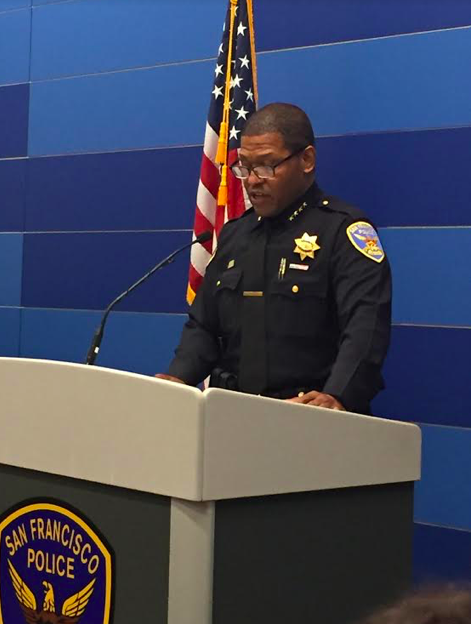The Board of Supes Rules Committee delayed action today on a new policy that would give the cops extensive new authority to use private cameras to spy on San Franciscans after a rather alarming presentation by Chief Scott.
The chief explained how the department wants to use cameras in real time to monitor, for example, not only drug dealing but drug use on the streets. “Open-air drug use is just as much a problem as dealing,” he said.

He said there are “pervasive felonious acts involving narcotics” and that the use of spy cameras could lead to more arrests.
The policy also allows the police to seek access to cameras for misdemeanors.
Scott told the supes that “there are cameras on every block in the city,” meaning that the cops potentially could have the ability to monitor almost every piece of outdoor real estate in San Francisco.
More: The chief said that there are circumstances where the cops think there might be a shooting, and they would like to spy on that area just in case someone does pull a gun:
We have locations in the city where we have gun violence that is pretty pervasive and—traditionally, there are intersections and corners we see the same thing repeated over and over. If we have information, about the possibility of shooting and ingredients are there for this event to happen, to me it just makes sense to tap in if surveillance cameras are there that are privately owned.
Sup. Rafael Mandelman: The notion is you think something bad will happen and it’s not super useful to have police on hand. But you want to respond in real time because someone showed up and you know when you see that person show up you know somebody will get shot.
Scott: Right. We think it will help.
So: There is a possibility of a shooting, and “the ingredients are there,” whatever that means, but instead of sending cops over to try to prevent it, the chief wants to watch the video so that if someone does get shot, they can move in quickly.
I’m not an expert, but this sounds like a combination of racial profiling and bad police work to me. On a stunning level. The cops apparently aren’t there to prevent crime; they are sitting behind a monitor so they can catch someone after a shooting they predict will happen, happens. And they know that because of … “the ingredients.”
Matt Cagle, staff attorney at the ACLU, put it this way:
Chief Scott gave the game away. SFPD wants to co-opt private cameras, apparently to place certain neighborhoods under near constant, preemptive surveillance. Police commandeering people’s cameras to spy on their neighbors doesn’t reduce crime but it will fuel inequality and invite racial profiling.
I was worried about this plan before the hearing started, and so were 17 local civil-liberties organizations. The more I heard about it, the worse it sounded.
Sup. Aaron Peskin suggested he would like to see the policy amended to eliminate the provision allowing surveillance whenever the cops suspect felonies and misdemeanors. That seems like the minimum here.
Cagle said that the level of surveillance the cops are asking for is “unprecedented in city history. It allows the police to monitor First Amendment protected activity, and broadly share the footage with police in other states.”
He also noted that the policy is “deeply unpopular,” and that polls show roughly two-thirds of likely November voters think this is a very bad idea.
Another key element: Many callers noted that the policy requires a level of trust in the intentions and actions of the San Francisco Police Department, which has repeatedly violated the public trust.
As one caller put it, “any technology will be abused by the people who have the authority to abuse it.”
Deputy Public Defender Niki Solis called in to point out that the SFPD has misused DNA from sexual assault cases. And we are supposed to trust the same cops not to misuse spy data?
“There have to be safeguards,” Solis said.
Peskin said he is in discussions with the SFPD and the Mayor’s Office, and that an new version of the policy will come back before the Rules Committee next week.






